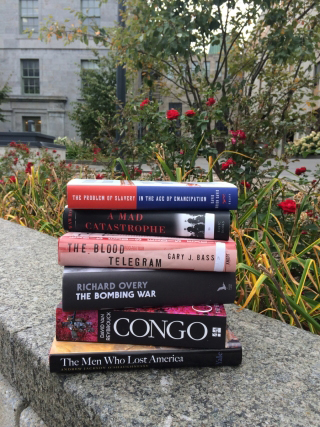
Six books to compete for US$75,000 grand prize
By Cynthia Lee
The six books vying for the 2014 Cundill Prize in Historical Literature were announced on Sept. 19, by Professor Christopher Manfredi, Dean of the Faculty of Arts. The books, which have as their respective themes, repercussions of war, genocide and slavery, are competing for the US$75,000 grand prize.
“The Cundill jury has once again delivered an impressive list of books for this year’s shortlist,” said Prof. Manfredi, who serves as Administrative Chair of the Cundill Prize. “The Cundill Prize aims to introduce outstanding history books to the wider public, shining a spotlight on a diverse range of topics that appeal to experts, informed readers, and history buffs.”
Now in its seventh year, the Cundill Prize is the world’s most lucrative international award for a nonfiction book, featuring a grand prize of US$75,000, with two “Recognition of Excellence” prizes of US$10,000 each.
The six shortlisted titles, chosen from a field of 165 submissions, are:
- Gary Bass – The Blood Telegram: Nixon, Kissinger and a Forgotten Genocide (Knopf)
- David Brion Davis – The Problem of Slavery in the Age of Emancipation (Knopf)
- Andrew O’Shaughnessy – The Men Who Lost America: British Leadership, the American Revolution, and the Fate of the Empire (Yale University Press)
- Richard Overy – The Bombing War: Europe 1939-45 (Allen Lane)
- David Van Reybrouck – Congo: The Epic History of a People (Fourth Estate)
- Geoffrey Wawro – A Mad Catastrophe: The Outbreak of World War I and the Collapse of the Habsburg Empire (Basic Books)
“This year’s shortlist takes us across time and around the globe: the monumental history of the Democratic Republic of Congo; the American Revolution and the fate of the British Empire; the history of the Blitz; the collapse of the Habsburg Empire and the start of WWI; slavery in the Age of Emancipation; and the 1971 atrocities in Bangladesh and the shaping of Asia,” said Manfredi. “Each book is a thorough examination of a time and place, and highlights how history shapes our present understanding of world events. The jury will have a tough time choosing the three finalists, and eventually the winner.”
The three finalists will be announced in mid-October. The grand prize winner of the 2014 Cundill Prize will be announced at an awards ceremony in Toronto on Thursday, Nov. 20.
This year’s Cundill Jury includes David Frum, author and a senior editor for The Atlantic; Marla R. Miller, Professor and Director, Public History Program and Graduate Program Director, the University of Massachusetts; Stuart Schwartz, Professor, Department of History, Yale University and the winner of the inaugural Cundill Prize; Thomas H.B. Symons, Founding President and Professor Emeritus, Trent University; and Althia Raj, Ottawa Bureau Chief, Huffington Post Canada.
About the Prize: The Cundill Prize in Historical Literature at McGill is the world’s most important international nonfiction historical literature prize. It was established in 2008 by McGill alumnus F. Peter Cundill, who passed away in January 2011. The prize is administered by McGill’s Dean of Arts, with the help of the McGill Institute for the Study of Canada, and is awarded annually to an individual who has published a book determined to have had a profound literary, social and academic impact in the area of history.
For more information on the Cundill Prize, go here.
On Oct. 8, Anne Applebaum, winner of the 2013 Cundill Prize (Iron Curtain: The Crushing of Eastern Europe, 1944 – 1956) will deliver the annual Cundill Lecture, titled True Believers? The Nature of Collaboration and Opposition in Communist Regimes. The lecture is free and open to the public and will be held in the Leacock Building (855 Sherbrooke Street West), Room 232. For more information and to register, go here.
